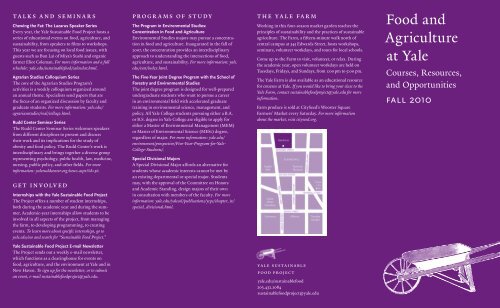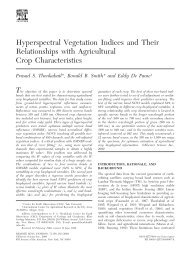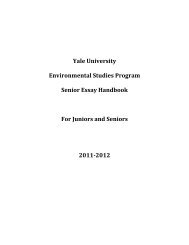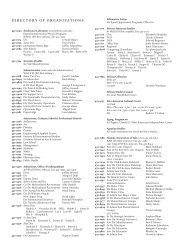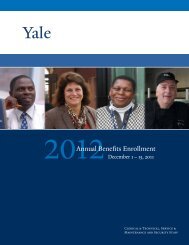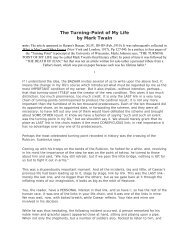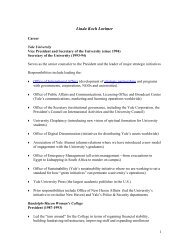Food and Agriculture at Yale
Food and Agriculture at Yale
Food and Agriculture at Yale
Create successful ePaper yourself
Turn your PDF publications into a flip-book with our unique Google optimized e-Paper software.
talks <strong>and</strong> seminars<br />
Chewing the F<strong>at</strong>: The Lazarus Speaker Series<br />
Every year, the <strong>Yale</strong> Sustainable <strong>Food</strong> Project hosts a<br />
series of educ<strong>at</strong>ional events on food, agriculture, <strong>and</strong><br />
sustainability, from speakers to films to workshops.<br />
This year we are focusing on local food issues, with<br />
guests such as Bun Lai of Miya’s Sushi <strong>and</strong> organic<br />
farmer Eliot Coleman. For more inform<strong>at</strong>ion <strong>and</strong> a full<br />
schedule: yale.edu/sustainablefood/calendar.html.<br />
Agrarian Studies Colloquium Series<br />
The core of the Agrarian Studies Program’s<br />
activities is a weekly colloquium organized around<br />
an annual theme. Specialists send papers th<strong>at</strong> are<br />
the focus of an organized discussion by faculty <strong>and</strong><br />
gradu<strong>at</strong>e students. For more inform<strong>at</strong>ion: yale.edu/<br />
agrarianstudies/real/colloq2.html.<br />
Rudd Center Seminar Series<br />
The Rudd Center Seminar Series welcomes speakers<br />
from different disciplines to present <strong>and</strong> discuss<br />
their work <strong>and</strong> its implic<strong>at</strong>ions for the study of<br />
obesity <strong>and</strong> food policy. The Rudd Center’s work is<br />
interdisciplinary <strong>and</strong> brings together a diverse group<br />
representing psychology, public health, law, medicine,<br />
nursing, public policy, <strong>and</strong> other fields. For more<br />
inform<strong>at</strong>ion: yaleruddcenter.org/news.aspx?id=36.<br />
get involved<br />
Internships with the <strong>Yale</strong> Sustainable <strong>Food</strong> Project<br />
The Project offers a number of student internships,<br />
both during the academic year <strong>and</strong> during the summer.<br />
Academic-year internships allow students to be<br />
involved in all aspects of the project, from managing<br />
the farm, to developing programming, to cre<strong>at</strong>ing<br />
events. To learn more about specific internships, go to<br />
yale.edu/seo <strong>and</strong> search for “Sustainable <strong>Food</strong> Project.”<br />
programs of study<br />
The Program in Environmental Studies:<br />
Concentr<strong>at</strong>ion in <strong>Food</strong> <strong>and</strong> <strong>Agriculture</strong><br />
Environmental Studies majors may pursue a concentr<strong>at</strong>ion<br />
in food <strong>and</strong> agriculture. Inaugur<strong>at</strong>ed in the fall of<br />
2007, the concentr<strong>at</strong>ion provides an interdisciplinary<br />
approach to underst<strong>and</strong>ing the intersections of food,<br />
agriculture, <strong>and</strong> sustainability. For more inform<strong>at</strong>ion: yale.<br />
edu/evst/index.html.<br />
The Five-Year Joint Degree Program with the School of<br />
Forestry <strong>and</strong> Environmental Studies<br />
The joint degree program is designed for well-prepared<br />
undergradu<strong>at</strong>e students who want to pursue a career<br />
in an environmental field with acceler<strong>at</strong>ed gradu<strong>at</strong>e<br />
training in environmental science, management, <strong>and</strong><br />
policy. All <strong>Yale</strong> College students pursuing either a B.A.<br />
or B.S. degree in <strong>Yale</strong> College are eligible to apply for<br />
either a Master of Environmental Management (MEM)<br />
or Master of Environmental Science (MESc) degree,<br />
regardless of major. For more inform<strong>at</strong>ion: yale.edu/<br />
environment/prospective/Five-Year-Program-for-<strong>Yale</strong>-<br />
College-Students/.<br />
Special Divisional Majors<br />
A Special Divisional Major affords an altern<strong>at</strong>ive for<br />
students whose academic interests cannot be met by<br />
an existing departmental or special major. Students<br />
may, with the approval of the Committee on Honors<br />
<strong>and</strong> Academic St<strong>and</strong>ing, design majors of their own<br />
in consult<strong>at</strong>ion with members of the faculty. For more<br />
inform<strong>at</strong>ion: yale.edu/yalecol/public<strong>at</strong>ions/ycps/chapter_iv/<br />
special_divisional.html.<br />
the yale farm<br />
Working in this four-season market garden teaches the<br />
principles of sustainability <strong>and</strong> the practices of sustainable<br />
agriculture. The Farm, a fifteen-minute walk north of<br />
central campus <strong>at</strong> 345 Edwards Street, hosts workshops,<br />
seminars, volunteer workdays, <strong>and</strong> tours for local schools.<br />
Come up to the Farm to visit, volunteer, or relax. During<br />
the academic year, open volunteer workdays are held on<br />
Tuesdays, Fridays, <strong>and</strong> Sundays, from 1:00 pm to 5:00 pm.<br />
The <strong>Yale</strong> Farm is also available as an educ<strong>at</strong>ional resource<br />
for courses <strong>at</strong> <strong>Yale</strong>. If you would like to bring your class to the<br />
<strong>Yale</strong> Farm, contact sustainablefoodproject@yale.edu for more<br />
inform<strong>at</strong>ion.<br />
Farm produce is sold <strong>at</strong> CitySeed’s Wooster Square<br />
Farmers’ Market every S<strong>at</strong>urday. For more inform<strong>at</strong>ion<br />
about the market, visit cityseed.org.<br />
<strong>Food</strong> <strong>and</strong><br />
<strong>Agriculture</strong><br />
<strong>at</strong> <strong>Yale</strong><br />
Courses, Resources,<br />
<strong>and</strong> Opportunities<br />
fall 2010<br />
<strong>Yale</strong> Sustainable <strong>Food</strong> Project E-mail Newsletter<br />
The Project sends out a weekly e-mail newsletter,<br />
which functions as a clearinghouse for events on<br />
food, agriculture, <strong>and</strong> the environment <strong>at</strong> <strong>Yale</strong> <strong>and</strong> in<br />
New Haven. To sign up for the newsletter, or to submit<br />
an event, e-mail sustainablefoodproject@yale.edu.<br />
yale sustainable<br />
food project<br />
yale.edu/sustainablefood<br />
203.432.2084<br />
sustainablefoodproject@yale.edu
courses fall 2010<br />
The world’s most pressing questions regarding health,<br />
culture, the environment, educ<strong>at</strong>ion, <strong>and</strong> the global<br />
economy cannot be adequ<strong>at</strong>ely addressed without<br />
considering the food we e<strong>at</strong> <strong>and</strong> the way we produce it.<br />
With the proper knowledge, we know th<strong>at</strong> <strong>Yale</strong> students<br />
will be <strong>at</strong> the forefront in finding answers to these<br />
questions. Read on for inform<strong>at</strong>ion about programs of<br />
study, courses in food <strong>and</strong> agriculture, <strong>and</strong> rel<strong>at</strong>ed talks<br />
<strong>and</strong> seminars th<strong>at</strong> focus on these issues.<br />
The following is only a selection of the courses available<br />
in food, agriculture, <strong>and</strong> the environment. You can find<br />
many more <strong>at</strong> yale.edu/sustainablefood/educ_courses.html.<br />
amst 419 / er&m 450<br />
L<strong>and</strong>, Homel<strong>and</strong>s, <strong>and</strong> American Indian Histories<br />
Alyssa Mt. Pleasant<br />
t 1.30–3.20, skills wr, areas hu<br />
Investig<strong>at</strong>ion of American Indian n<strong>at</strong>ions’ rel<strong>at</strong>ionships<br />
with their homel<strong>and</strong>s, from cre<strong>at</strong>ion traditions through<br />
the colonial period to l<strong>at</strong>e twentieth-century l<strong>and</strong> claims<br />
litig<strong>at</strong>ion. Significant themes include American Indians’<br />
inscription of meaning onto the l<strong>and</strong>scapes they know<br />
as their homel<strong>and</strong>s, <strong>and</strong> contest<strong>at</strong>ion over these l<strong>and</strong>s in<br />
the post-contact period.<br />
anth 438<br />
Culture, Power, Oil<br />
Douglas Rogers<br />
t 1.30–3.20, areas so<br />
Study of the production, circul<strong>at</strong>ion, <strong>and</strong> consumption<br />
of petroleum in order to explore topics in globaliz<strong>at</strong>ion,<br />
empire, cultural performance, n<strong>at</strong>ural resource extraction,<br />
<strong>and</strong> the n<strong>at</strong>ure of the st<strong>at</strong>e. Case studies include<br />
the United St<strong>at</strong>es, Saudi Arabia, Nigeria, Venezuela, <strong>and</strong><br />
the former Soviet Union.<br />
arch 344<br />
Urban Life <strong>and</strong> L<strong>and</strong>scape<br />
Elihu Rubin<br />
t 1.30–3.20, areas hu<br />
The built environment as a text tool for constructing<br />
narr<strong>at</strong>ives of human activity, aspir<strong>at</strong>ion, <strong>and</strong> struggle.<br />
Methods of viewing the ordinary l<strong>and</strong>scape of the<br />
twentieth-century American city: pulling apart<br />
its historical layers, examining social meanings, <strong>and</strong><br />
observing its function today. Modes of inquiry include<br />
video, public present<strong>at</strong>ions, field trips, photography,<br />
<strong>and</strong> writing.<br />
east 408 / socy 395 / ep&e 308<br />
Wealth <strong>and</strong> Poverty in Modern China<br />
Deborah Davis<br />
w 1.30–3.20, areas so<br />
The underlying causes <strong>and</strong> consequences of the changing<br />
distribution of income, m<strong>at</strong>erial assets, <strong>and</strong> political power<br />
in contemporary China. Substantive focus on inequality<br />
<strong>and</strong> str<strong>at</strong>ific<strong>at</strong>ion. Instruction in the use of online Chinese<br />
resources relevant to research. Optional weekly Chinese<br />
language discussions. Prerequisite: a previous course on<br />
China since 1949.<br />
e&eb 160<br />
Diversity of Life<br />
Wendy Clement<br />
tth 2.30–3.45 kbt 102, areas sc<br />
A survey of the diversity of organisms on Earth<br />
with a focus on their evolutionary history, biology,<br />
<strong>and</strong> adapt<strong>at</strong>ions to their environment.<br />
enas 443 / enve 443 / f&es 380<br />
Greening Business Oper<strong>at</strong>ions<br />
Thomas Graedel <strong>and</strong> Marian Chertow<br />
mw 1.00–2.15<br />
Engineering, environmental, <strong>and</strong> financial perspectives<br />
applied to selected industries. Methods from oper<strong>at</strong>ions<br />
management, industrial ecology, green chemistry <strong>and</strong><br />
engineering, <strong>and</strong> accounting <strong>and</strong> finance are used to<br />
investig<strong>at</strong>e sustainability approaches <strong>and</strong> the rel<strong>at</strong>ionship<br />
between environmental <strong>and</strong> economic consider<strong>at</strong>ions.<br />
Tools include discounted cash-flow analysis, life-cycle<br />
assessment, <strong>and</strong> environmental cost accounting. Field trips<br />
to companies.<br />
evst 215<br />
Scientific <strong>and</strong> Environmental Writing<br />
Carl Zimmer<br />
t 9.25–11.15 , skills wr<br />
An intensive workshop in writing about science <strong>and</strong> the<br />
environment for a broad audience. Transl<strong>at</strong>ing complex<br />
subjects into elegant prose, conducting interviews,<br />
h<strong>and</strong>ling controversies, researching articles, <strong>and</strong> finding<br />
one’s voice. Readings include exemplary works ranging<br />
from newspaper articles to book excerpts.<br />
evst 424 / plsc 420<br />
Rivers: N<strong>at</strong>ure <strong>and</strong> Politics<br />
James Scott<br />
w 3.30–5.20, areas so<br />
The n<strong>at</strong>ural history of rivers <strong>and</strong> river systems <strong>and</strong> the<br />
politics surrounding the efforts of st<strong>at</strong>es to manage <strong>and</strong><br />
engineer them.<br />
evst 285 / f&es 285<br />
Political Ecology: N<strong>at</strong>ure, Culture, <strong>and</strong> Power<br />
Amity Doolittle<br />
t 1.30–3.20, areas so<br />
Study of the rel<strong>at</strong>ionship between society <strong>and</strong> the<br />
environment. Global processes of environmental<br />
conserv<strong>at</strong>ion, development, <strong>and</strong> conflicts over<br />
n<strong>at</strong>ural resource use; political-economic contexts of<br />
environmental change; ways in which underst<strong>and</strong>ings<br />
of n<strong>at</strong>ure are discursively bound up with notions of<br />
culture <strong>and</strong> identity.<br />
evst 386<br />
Environmental History of the Middle East<br />
Alan Mikhail<br />
m 3.30–5.20, skills wr, areas hu<br />
Explor<strong>at</strong>ion of how one writes an environmental<br />
history of the Middle East. Consider<strong>at</strong>ion of wh<strong>at</strong><br />
environmental history is; questions of method, sources,<br />
<strong>and</strong> historiography. Topics include irrig<strong>at</strong>ion, forestry,<br />
agriculture, animal technology, gender <strong>and</strong> n<strong>at</strong>ure,<br />
gardens, colonialism, environmentalism, <strong>and</strong> disease.<br />
evst 398<br />
Energy, Clim<strong>at</strong>e, Law, <strong>and</strong> Policy<br />
John Wargo<br />
m 1.30–3.20, areas so<br />
Overview of the legal norms governing p<strong>at</strong>terns of energy<br />
use <strong>and</strong> associ<strong>at</strong>ed adverse effects on clim<strong>at</strong>e stability,<br />
environmental quality, <strong>and</strong> human health. Focus on<br />
U.S. law <strong>and</strong> policy, with some consider<strong>at</strong>ion of relevant<br />
intern<strong>at</strong>ional tre<strong>at</strong>ies. Special <strong>at</strong>tention to building<br />
efficiency <strong>and</strong> to l<strong>and</strong>-use regul<strong>at</strong>ion <strong>and</strong> urban growth,<br />
particularly coastal prospecting <strong>and</strong> development.<br />
g&g 205<br />
N<strong>at</strong>ural Resources <strong>and</strong> Their Sustainability<br />
David Evans <strong>and</strong> Jay Ague<br />
tth 9.00–10.15, areas sc<br />
The form<strong>at</strong>ion <strong>and</strong> distribution of renewable <strong>and</strong><br />
nonrenewable energy, mineral, <strong>and</strong> w<strong>at</strong>er resources.<br />
Topics include the consequences of extraction <strong>and</strong><br />
use; depletion <strong>and</strong> the availability of substitutes; <strong>and</strong><br />
economic <strong>and</strong> geopolitical issues. Recommended<br />
prepar<strong>at</strong>ion: introductory chemistry <strong>and</strong> geology.<br />
hshm 202 / amst 247 / hist 147<br />
Media <strong>and</strong> Medicine in Modern America<br />
John Warner <strong>and</strong> Gretchen Berl<strong>and</strong><br />
tth 10.30–11.20, 1 htba, areas hu<br />
Rel<strong>at</strong>ionships between medicine, health, <strong>and</strong><br />
the media in the United St<strong>at</strong>es from 1880 to the<br />
present. The changing role of the media in shaping<br />
conceptions of the body, cre<strong>at</strong>ing new diseases,<br />
influencing health <strong>and</strong> health policy, crafting<br />
the image of the medical profession, informing<br />
expect<strong>at</strong>ions of medicine <strong>and</strong> constructions of<br />
citizenship, <strong>and</strong> the medicaliz<strong>at</strong>ion of American life.<br />
psyc 419<br />
<strong>Food</strong> Policy <strong>and</strong> Science<br />
Kelly Brownell<br />
m 1.30–3.20, areas so<br />
The science on food <strong>and</strong> nutrition is connected with<br />
pressing policy issues. Topics include hunger, obesity,<br />
<strong>and</strong> the impact of food production <strong>and</strong> consumption<br />
on the environment.<br />
wgss 120<br />
Women, <strong>Food</strong>, <strong>and</strong> Culture<br />
Maria Trumpler<br />
tth 1.30–2.20, areas so<br />
Interdisciplinary explor<strong>at</strong>ion of the gendering of<br />
food production, prepar<strong>at</strong>ion, <strong>and</strong> consumption in<br />
cross-cultural perspective. Topics include agricultural<br />
practices, cooking, pasteuriz<strong>at</strong>ion, kitchen technology,<br />
food storage, home economics, hunger, anorexia,<br />
breast-feeding, meals, <strong>and</strong> ethnic identity.


